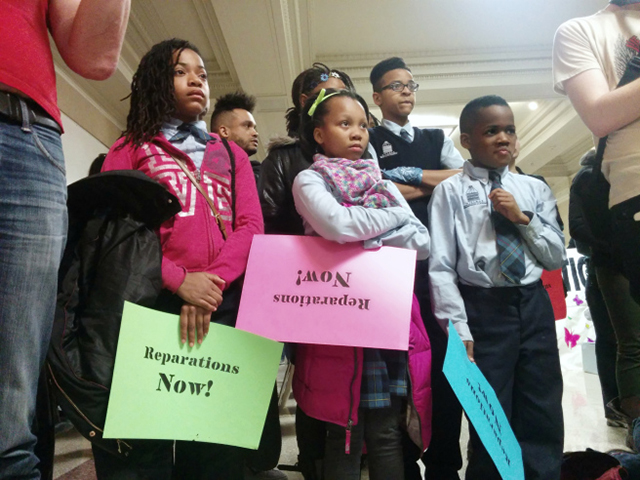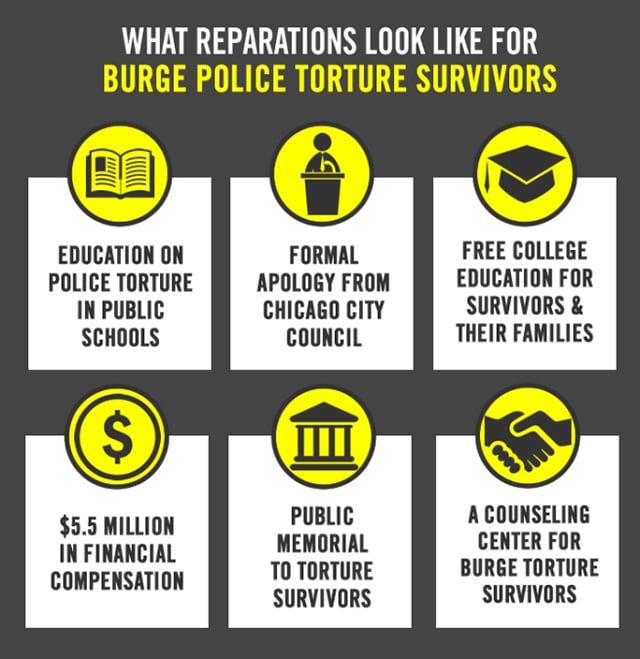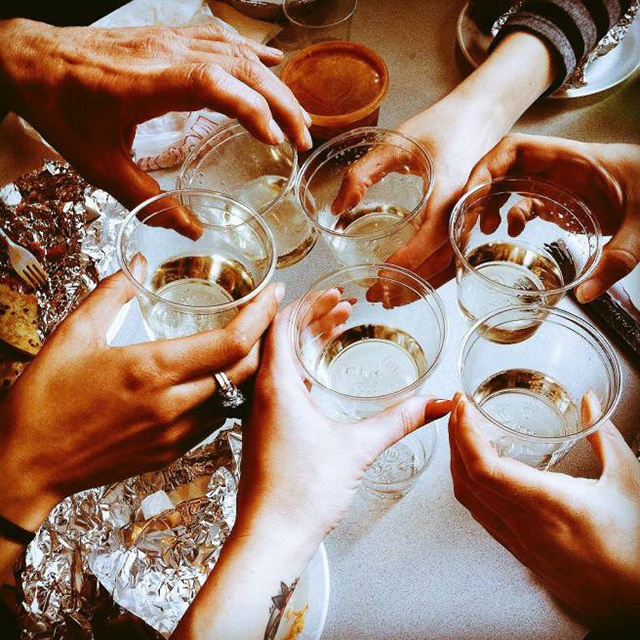
Did you know that Truthout is a nonprofit and independently funded by readers like you? If you value what we do, please support our work with a donation.
Tuesday was a historic day in Chicago. The movement for reparations for survivors of police torture is on the brink of a tremendous victory, as Chicago’s City Council now stands ready to pass the first legislation in US history that provides reparations, including financial compensation, for police violence.
Afters years of campaigning, and months of heavy protest, Mayor Rahm Emanuel has now signed off on a version of the ordinance. With the mayor’s backing, passage of the ordinance, which already had the support of the majority of the City Council, seems highly likely.
While the negotiated version of the ordinance provides less compensation to individuals tortured under Jon Burge than was originally demanded, it retains much of what led people like myself to join this fight. It remains, as organizer Mariame Kaba has said, “a transformative document.”
According to Chicago Torture Justice Memorials, the final version of the ordinance will include: “a formal apology for the torture; specialized counseling services to the Burge torture survivors and their family members on the South side; free enrollment and job training in City Colleges for survivors and family members; a history lesson about the Burge torture cases taught in Chicago Public schools; a permanent public memorial to the survivors; and it sets aside $5.5 million for a Reparations Fund for Burge Torture Victims that will allow the Burge torture survivors with us today to receive financial compensation for the torture they endured.”
 (Image: Project NIA)
(Image: Project NIA)
Tuesday night, I had the privilege of sitting in a room with organizers and community members who have spent months, and in some cases years, working to pass this ordinance. Organizers with Chicago Torture Justice Memorials, Project NIA, Amnesty International, We Charge Genocide, The Chicago Light Brigade, and unaffiliated members of the community shared a meal and heard each other’s thoughts on the day’s progress. Having only joined the fight myself last winter, I was grateful to share space with so many devoted change makers last night, and to hear their reflections on how far this fight has come. In listening to those who had waged this fight the longest, I noticed a recurring theme: the importance of naming harm.
Flint Taylor, of the People’s Law Office talked about the early days of the fight against Burge, when he was working to defend those who had been charged and imprisoned after being tortured by Burge’s “midnight crew.” He explained that there was significant push back against referring to what had been done to the victims as “torture.” Despite the ghastly nature of the harms done to the prisoners, including near suffocation and repeated genital electrocution, “People wanted to call it police brutality,” Taylor explained. “But we knew we needed to call it what it was. We knew we needed to call it torture.” Taylor likened the debate over referring to what happened to the survivors as torture to the debate over whether the ordinance could be referred to as “reparations,” back when the campaign for this form of restitution began. “I have the same respect for calling this reparations as I did for calling what happened torture,” he said.
These ideas repeatedly emerged, as people who built early support for the ordinance talked about how they were told the word “reparations” would alienate a mainstream audience. As I listened, I thought about why these debates over words had played out the way they did. It is easier for people who experience a significant amount of privilege in this society to concede that police can at times be “brutal,” than it is to acknowledge that torture is carried out in their names, in their backyards, by agents of their own government. It is likewise easier to acknowledge the need for a “settlement” for harms done, than to imagine that one lives in a society that owes actual reparations for the oppressive conditions it has imposed.
In this country, the word “reparations” is a direct challenge to white supremacy. In Chicago, it is a demand that the city be held accountable for the actions of the greatest purveyors of white supremacy within its boundaries: its own police. It is no coincidence that Burge’s detectives specifically targeted Black men, and it is not surprising that not one of them was ever brought to trial for the acts of torture they committed. Both the anti-blackness that informed their crimes, and the torturous nature of their actions were consistent with the origins and overall practice of policing in this country.
It is worth remembering, and in fact should never be forgotten, that after Jon Burge was fired, amid torture allegations, the Fraternal Order of Police attempted to create a parade float in his honor.
Thus, to pretend that these events were extraordinary, and an affront to the norms of our culture, denies the past as well as the present. To give either the harms or the remedies mundane names dulls a discourse that should, in fact, be painful. The realization of what is normalized in this country should ring as harshly as the word “torture” in the ears of those who have chosen not to hear the voices of the afflicted. Those who make excuses for police, talking about the “split second” they have to make decisions about their own safety, should be confronted, in very real terms, with what the disposability of Black and Brown lives looks like in the United States.
One of the groups I work with is an organization called We Charge Genocide. As a young group, that has existed for almost a year now, we have likewise encountered push back over word choice. People applaud the work our group has done in the community. They applaud our data collection efforts, and praise the young people we sent to the United Nations to present a shadow report on police violence in Chicago. But even as the United Nations Committee Against Torture agreed with our findings, and pointed an accusing finger at the Chicago police for their racist, abusive practices, some have chosen to focus on our name, and argue with us about what the word “genocide” really means.
People often resist words that disturb their peace, but those who are denied peace are often armed with little more than words as they resist oppression. So, even when it meant a more uphill battle, the organizers and attorneys behind the ordinance chose the word that summed up what was actually needed: reparations. And in doing so, they have given the proper name to a historic moment.
As someone who has been primarily involved in the action building aspect of the campaign in recent months, I am in awe of those who have waged this struggle for years, in courtrooms, in meetings, and in countless spaces where the voices of those most affected by this violence were lifted and heard. Chicago Torture Justice Memorials has created a blueprint for this kind of effort, and all who believe in justice are in their debt today. I am also more inspired than I can say by the resolve of the survivors, like Darrell Cannon, Anthony Holmes, and Mark Clements, who have consistently found the strength to tell their stories, not simply for their own sakes, but because they believe the world can do better. As Mario Venegas, a survivor of torture under Pinochet in Chile, observed last night, “It is very difficult to contain yourself, when you talk the way they talked today. To tell those stories.” Mario added that listening to the torture survivors testify in City Hall brought back memories of his own torture in Chile, where some of the same techniques, including electrocution, were used.
Mario went on to stress how important it is that we show up in numbers on May 6, 2015, when the ordinance comes to a vote, and I couldn’t agree more. This victory is not yet official, but even when it becomes so, the fight will be far from over. While attempts to co-opt this struggle are already underway, the real danger at hand is that this progress could be seen as a final chapter.
This is not a happy ending.
This is not closure.
This is a crack in the wall of the establishment.
It is an opening, where grassroots organizers and torture survivors have forced truth and some amount of justice into the workings of the system.
By forcing a major city to pay reparations for police torture, activists have blasted a hole in the illusions of those who would ignore victims of state violence. But a victory that includes writing the truth of police torture into our public school curriculum requires a great deal of follow through. Who will write that history, and in whose voice will these stories be told? To drive this fight forward, and to continue the work of transformation, we must take what strength we can from our wins, as they are few and far between, but we must also treat moments like this one as beginnings, rather than endings.
I’ll see you all May 6th, at City Hall, when we come together to pass this thing. And after that, I’ll see you in the streets.
 Chicago organizers raising a glass to the struggle, and to the day’s progress. (Photo: Brit Schulte)
Chicago organizers raising a glass to the struggle, and to the day’s progress. (Photo: Brit Schulte)
Trump is silencing political dissent. We appeal for your support.
Progressive nonprofits are the latest target caught in Trump’s crosshairs. With the aim of eliminating political opposition, Trump and his sycophants are working to curb government funding, constrain private foundations, and even cut tax-exempt status from organizations he dislikes.
We’re concerned, because Truthout is not immune to such bad-faith attacks.
We can only resist Trump’s attacks by cultivating a strong base of support. The right-wing mediasphere is funded comfortably by billionaire owners and venture capitalist philanthropists. At Truthout, we have you.
Truthout has launched a fundraiser, and we have only 48 hours left to raise $21,000. Please take a meaningful action in the fight against authoritarianism: make a one-time or monthly donation to Truthout. If you have the means, please dig deep.